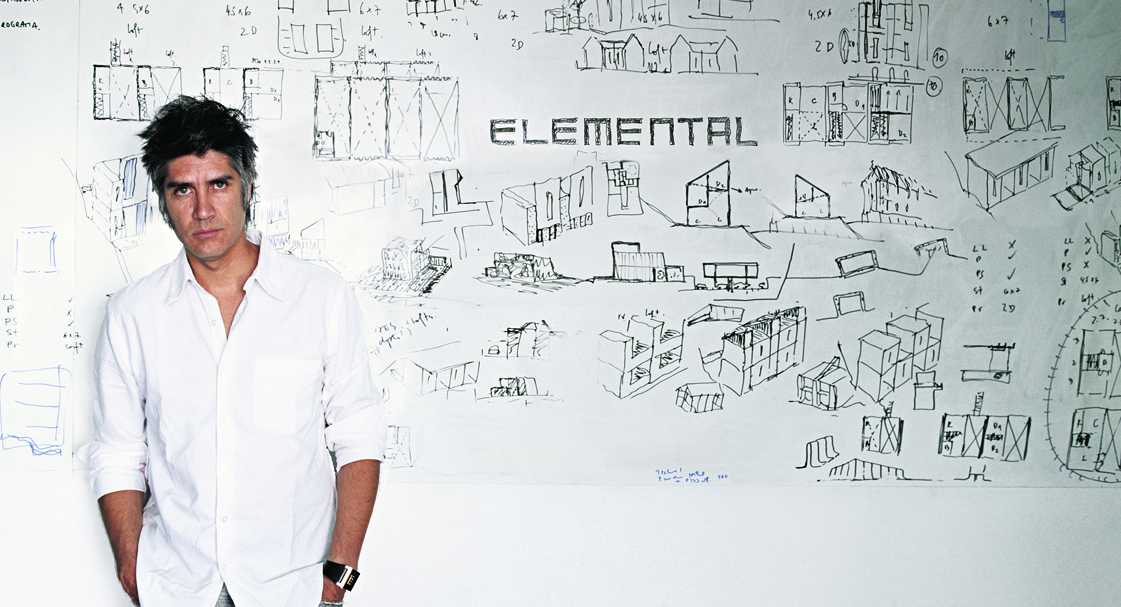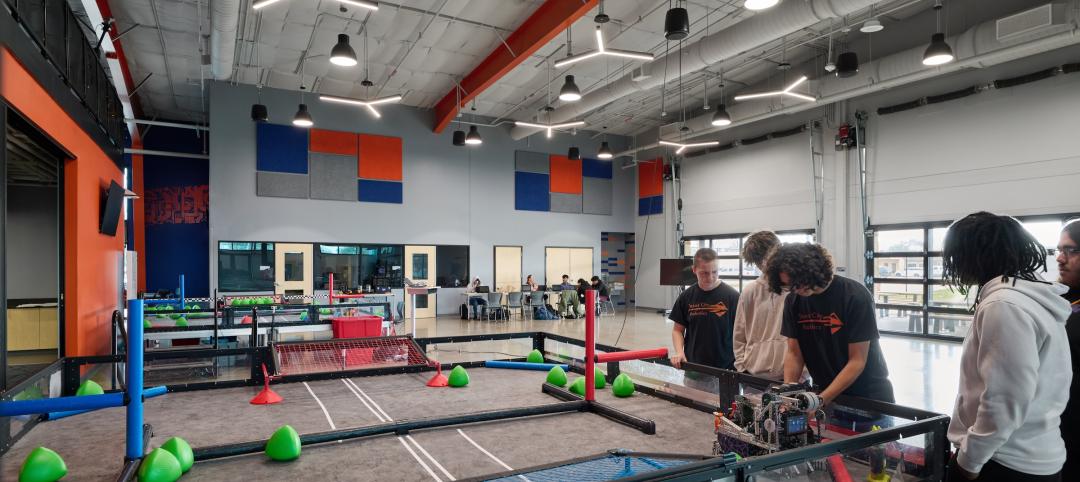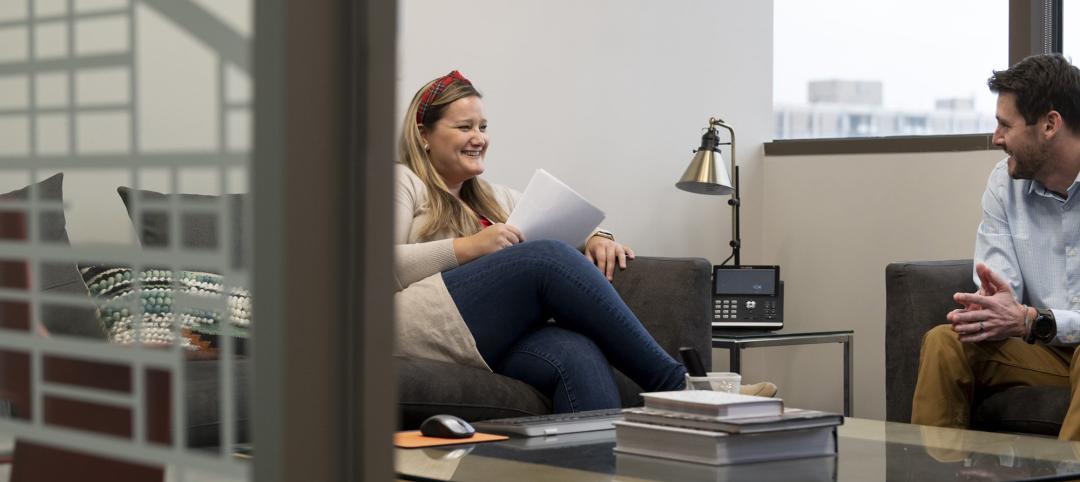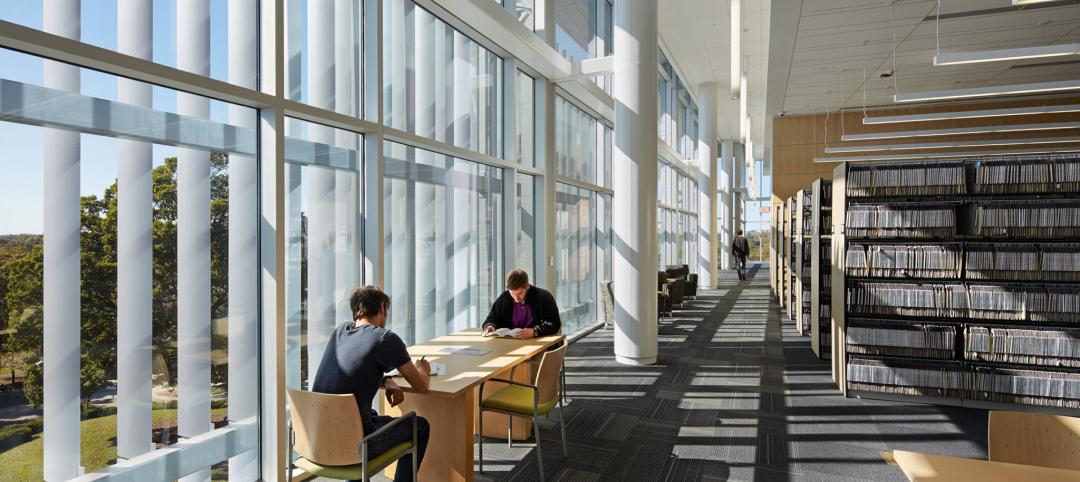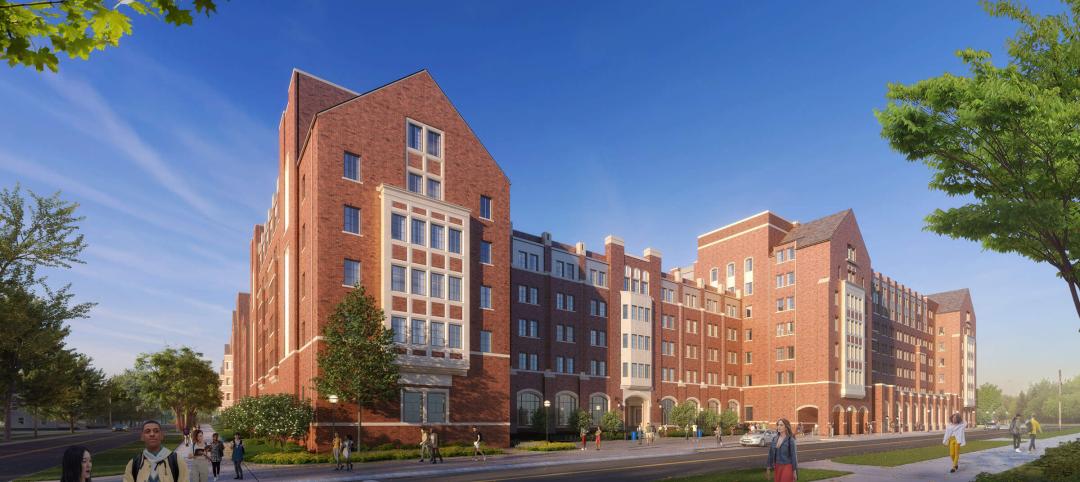Alejandro Aravena has been selected as the 2016 Pritzker Architecture Prize Laureate, Tom Pritzker announced today. The 48-year-old architect is based in Santiago, Chile.
Aravena becomes the 41st laureate of the Pritzker Prize, the first Pritzker Laureate from Chile, and the fourth from Latin America, after Luis Barragán (1980), Oscar Niemeyer (1988), and Paulo Mendes da Rocha (2006). Aravena will receive the award during a ceremony at United Nations Headquarters in New York on April 4, 2016.
“Alejandro Aravena has pioneered a collaborative practice that produces powerful works of architecture and also addresses key challenges of the 21st century,” said Pritzker, who is the Chairman and President of The Hyatt Foundation, which sponsors the prize. “His built work gives economic opportunity to the less privileged, mitigates the effects of natural disasters, reduces energy consumption, and provides welcoming public space. Innovative and inspiring, he shows how architecture at its best can improve people’s lives.”
Among Aravena’s work are a series of buildings at the esteemed Universidad Católica de Chile in Santiago: the UC Innovation Center – Anacleto Angelini (2014), Siamese Towers (2005), Medical School (2004), School of Architecture (2004), and the Mathematics School (1999). These energy-efficient buildings respond to the local climate with innovative, efficient facades and floor plans, and offer the users natural light and convivial meeting places.
Currently under construction in Shanghai, China, is an office building for healthcare company Novartis, with office spaces designed to accommodate different modes of work: individual, collective, formal, and informal. In the U.S., Aravena has built St. Edward’s University Dorms (2008) in Austin, Texas.
“Alejandro Aravena has delivered works of architectural excellence in the fields of private, public, and educational commissions both in his home country and abroad,” stated the Pritzker Jury, led by Chairman Lord Peter Palumbo. “He understands materials and construction, but also the importance of poetry and the power of architecture to communicate on many levels.”
Since 2001, Aravena has been Executive Director of the Santiago-based ELEMENTAL, a “Do Tank,” as opposed to a think tank, whose partners are Gonzalo Arteaga, Juan Cerda, Victor Oddó, and Diego Torres. ELEMENTAL focuses on projects of public interest and social impact, including housing, public space, infrastructure, and transportation. ELEMENTAL has designed more than 2,500 units of low-cost social housing. The firm is also known for designing social housing that they call “half of a good house,” in which the design leaves space for the residents to complete their houses themselves and thus raise themselves up to a middle-class standard of living. This innovative approach, called “incremental housing,” allows for social housing to be built on more expensive land closer to economic opportunity and gives residents a sense of accomplishment and personal investment.
In response to being named the 2016 Laureate of the Pritzker Architecture Prize, Mr. Aravena emailed: “Looking backwards, we feel deeply thankful. No achievement is individual. Architecture is a collective discipline. So we think, with gratitude, of all the people who contributed to give form to a huge diversity of forces at play. Looking into the future we anticipate Freedom! The prestige, the reach, the gravitas of the prize is such that we hope to use its momentum to explore new territories, face new challenges, and walk into new fields of action. After such a peak, the path is unwritten. So our plan is not to have a plan, face the uncertain, be open to the unexpected. Finally, looking at the present, we are just overwhelmed, ecstatic, happy. It's time to celebrate and share our joy with as many people as possible.”
Jury Citation
Alejandro Aravena is leading a new generation of architects that has a holistic understanding of the built environment and has clearly demonstrated the ability to connect social responsibility, economic demands, design of human habitat, and the city. Few have risen to the demands of practicing architecture as an artful endeavor, as well as meeting today's social and economic challenges. Aravena, from his native Chile, has achieved both, and in doing so has meaningfully expanded the role of the architect.
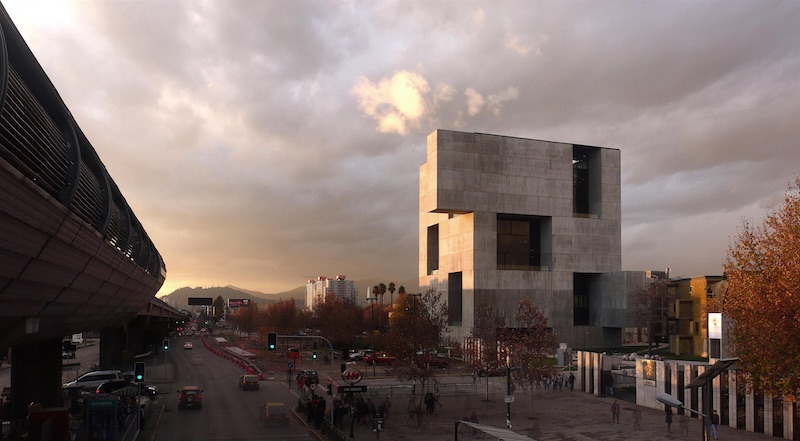 UC Innovation Center – Anacleto Angelini, 2014, San Joaquín Campus, Universidad Católica de Chile, Santiago, Chile. Photo by Nina Vidic
UC Innovation Center – Anacleto Angelini, 2014, San Joaquín Campus, Universidad Católica de Chile, Santiago, Chile. Photo by Nina Vidic
Born in 1967, and practicing since 1994, Aravena has consistently pursued architecture with a clarity of vision and great skill. Undertaking several buildings for his alma mater, the Universidad Católica de Chile, including the Mathematics School (1998), Medical School (2001), the renovation of the School of Architecture (2004), Siamese Towers (2005), and more recently the UC Innovation Center – Anacleto Angelini (2014). Each building shows an understanding of how people will use the facility, the thoughtful and appropriate use of materials, and a commitment to creating public spaces to benefit the larger community.
In the Angelini Innovation Center, the maturity of this architect is apparent. A powerful structure from a distance, it is remarkably humane and inviting. Through a reversal of convention, the building is an opaque concrete structure on the exterior and has a light filled glass atrium inside. With the mass of the building at the perimeter, the energy consumption is minimal. The interior has many places for spontaneous encounters and transparency that enables viewing activity throughout. Aravena has created a rich environment of lively, interesting and welcoming spaces.
Aravena has delivered works of architectural excellence in private, public, and educational commissions both in his home country and abroad, including the United States—a residence and dining hall at St. Edward's University in Austin, Texas—and as far away as Shanghai, China for the pharmaceutical company Novartis. He has undertaken projects of different scales from single-family houses to large institutional buildings. In all his works, he approaches the task with a freshness and ability to start without any predetermined idea or form. He understands materials and construction, but also the importance of poetry and the power of architecture to communicate on many levels.
 Siamese Towers, 2005, San Joaquín Campus, Universidad Católica de Chile, Santiago, Chile, University classrooms and offices. Photo by Cristobal Palma
Siamese Towers, 2005, San Joaquín Campus, Universidad Católica de Chile, Santiago, Chile, University classrooms and offices. Photo by Cristobal Palma
What really sets Aravena apart is his commitment to social housing. Since 2000 and the founding of ELEMENTAL, he and his collaborators have consistently realized works with clear social goals. Calling the company a “Do Tank,” as opposed to a think tank, they have built more than 2,500 units using imaginative, flexible and direct architectural solutions for low cost social housing. The ELEMENTAL team participates in every phase of the complex process of providing dwellings for the underserved: engaging with politicians, lawyers, researchers, residents, local authorities, and builders, in order to obtain the best possible results for the benefit of the residents and society.
An understanding of the importance of the aspirations of the inhabitants and their active participation and investment in a project, as well as good design, have contributed to the creation of new opportunities for those from underprivileged backgrounds. This inventive approach enlarges the traditional scope of the architect and transforms the professional into a universal figure with the aim of finding a truly collective solution for the built environment.
The younger generation of architects and designers who are looking for opportunities to affect change, can learn from the way Aravena takes on multiple roles instead of the singular position of a designer to facilitate a housing project, and by doing so, discovers that such opportunities may be created by architects themselves. Through this approach, he gives the profession of architect a new dimension, which is necessary to respond to present demands and meet future challenges of the field.
Aravena epitomizes the revival of a more socially engaged architect, especially in his long-term commitment to tackling the global housing crisis and fighting for a better urban environment for all. He has a deep understanding of both architecture and civil society, as is reflected in his writing, his activism and his designs. The role of the architect is now being challenged to serve greater social and humanitarian needs, and Alejandro Aravena has clearly, generously and fully responded to this challenge. For the inspiration he provides through his example and his contributions to architecture and humanity past and future, Aravena is the recipient of the 2016 Pritzker Architecture Prize.
Related Stories
K-12 Schools | Aug 8, 2024
New K-12 STEM center hosts robotics learning, competitions in Houston suburb
A new K-12 STEM Center in a Houston suburb is the venue for robotics learning and competitions along with education about other STEM subjects. An unused storage building was transformed into a lively space for students to immerse themselves in STEM subjects. Located in Texas City, the ISD Marathon STEM and Robotics Center is the first of its kind in the district.
Affordable Housing | Aug 7, 2024
The future of affordable housing may be modular, AI-driven, and made of mushrooms
Demolished in 1989, The Phoenix Ironworks Steel Factory left a five-acre hole in West Oakland, Calif. After sitting vacant for nearly three decades, the site will soon become utilized again in the form of 316 affordable housing units.
Architects | Aug 5, 2024
Mastering the art of project schedule: Expert insights on design and construction
We sat down with two experts in the design field, Ron Dick (Founding Partner and Architect) and Mike Niezer (COO and Architect), to talk about everything you need to know about the entire process.
University Buildings | Aug 1, 2024
UC Riverside’s student health center provides an environment on par with major medical centers
The University of California, Riverside's new Student Health and Counseling Center (SHCC) provides a holistic approach to wellness for students throughout the UC Riverside campus. Designed by HGA and delivered through a design-build partnership with Turner Construction Company, SHCC provides healthcare offerings in an environment on par with major medical centers.
Libraries | Aug 1, 2024
How current and future trends are shaping the libraries of tomorrow
Over the last few years, public libraries have transitioned from being buildings that only store and lend books to being fully featured community centers.
MFPRO+ News | Aug 1, 2024
Canada tries massive incentive program to spur new multifamily housing construction
Canada has taken the unprecedented step of offering billions in infrastructure funds to communities in return for eliminating single-family housing zoning.
Government Buildings | Aug 1, 2024
One of the country’s first all-electric fire stations will use no outside energy sources
Charlotte, N.C.’s new Fire Station #30 will be one of the country’s first all-electric fire stations, using no outside energy sources other than diesel fuel for one or two of the fire trucks. Multiple energy sources will power the station, including solar roof panels and geothermal wells. The two-story building features three truck bays, two fire poles, dispatch area, contamination room, and gear storage.
Contractors | Aug 1, 2024
Nonresidential construction spending decreased 0.2% in June
National nonresidential construction spending declined 0.2% in June, according to an Associated Builders and Contractors analysis of data published today by the U.S. Census Bureau. On a seasonally adjusted annualized basis, nonresidential spending totaled $1.21 trillion. Nonresidential construction has expanded 5.3% from a year ago.
Student Housing | Jul 31, 2024
The University of Michigan addresses a decades-long student housing shortage with a new housing-dining facility
The University of Michigan has faced a decades-long shortage of on-campus student housing. In a couple of years, the situation should significantly improve with the addition of a new residential community on Central Campus in Ann Arbor, Mich. The University of Michigan has engaged American Campus Communities in a public-private partnership to lead the development of the environmentally sustainable living-learning student community.
MFPRO+ New Projects | Jul 31, 2024
Shipping containers converted into attractive, affordable multifamily housing in L.A.
In the Watts neighborhood in Los Angeles, a new affordable multifamily housing project using shipping containers resulted in 24 micro-units for formerly unhoused residents. The containers were acquired from a nearby port and converted into housing units at a factory.


